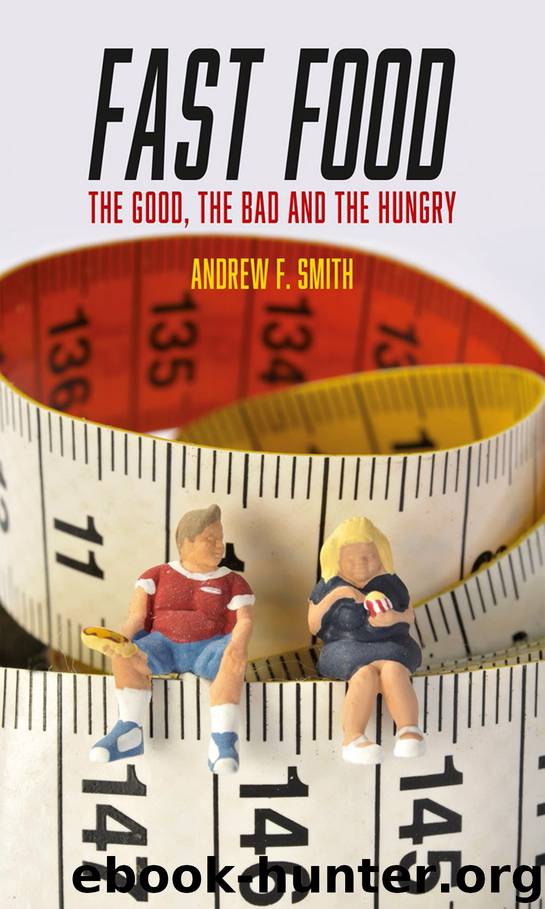Fast Food by Andrew F. Smith

Author:Andrew F. Smith
Language: eng
Format: epub
Publisher: Reaktion Books
Eco-Fast Food?
Fast-food companies have responded to environmental issues by modifying their packaging; redesigning unsightly buildings; changing their suppliers; and making their outlets ‘greener’. There has been an upsurge of interest in creating more environmentally friendly fast-food establishments. Chains such as Burgerville in Oregon and Washington use alternative energy sources, serve more local ingredients and offer more vegetarian items. Rather than handing out a toy, Burgerville includes a packet of garden seeds in its kids’ meals. Other chains encourage cyclists to use drive-through facilities.
Some fast-food businesses have begun to use renewable energy sources, such as solar power and wind turbines, to help decrease their dependence on the power grid. Research has shown that restaurants could cut 50 per cent of their power needs by using more energy-efficient appliances. Burgerville, for example, employs wind power for its electrical needs. In 2010 Burger King unveiled a new energy-efficient restaurant in Waghäusel, Germany. It uses renewable energy for about one-third of its electricity needs, and has greatly reduced its overall energy use, thereby substantially reducing both energy costs and emissions.
Many fast-food companies have attempted to lower their carbon footprint. McDonald’s, for instance, has made strides in key areas, including product offerings and managing its supply chain. Chipotle Mexican Grill, an American chain that also has about 1,000 outlets in the UK, Canada, Germany and France, is recognized as an industry leader when it comes to sustainable practices and sourcing. Sustainability efforts in the fast-food industry range from promoting healthy food choices like salads, carrot sticks and low-fat milk to using green building techniques and sourcing sustainable ingredients and materials.
New eco-fast-food restaurants are popping up around the world. Amanda’s Feel Good Fresh Food restaurant in Berkeley, California, was launched in 2006 by Amanda West and survived in this highly competitive field for only a few years. It served naturally raised beef (in smaller-than-standard portion sizes), freshly made sodas sweetened without corn syrup, baked sweet-potato fries and salads. All packaging was biodegradable and could be disposed of in receptacles along with food waste for composting.
Elevation Burgers, launched by Hans Hess in the U.S. in 2005, is a ‘fast casual’ franchise restaurant chain with about fifteen locations. Its hamburgers are made with 100 per cent organic beef, and it offers a variety of vegetarian options. The outlets make use of sustainable materials such as bamboo and are designed to be as energy efficient as possible. The corporate headquarters are in Arlington, Virginia.
In 2010 Otarian, a small chain launched in London, New York and Australia, served low-carbon-emission vegetarian fare in its fast-casual restaurants. The menu included vegetarian burgers, wraps and flatbreads, curries, pasta dishes, soups, salads and desserts. Otarian’s ‘Eco2tarian Labelling’ compared the greenhouse-gas emissions of the ingredients in its dishes with similar ones containing meat, fish or egg. The small chain was widely praised for its attempt to make its customers aware of the environmental consequences of the foods they ate, but it fared badly and most outlets closed.
Perhaps the most environmentally conscious fast-food chain is Max, Sweden’s first hamburger chain.
Download
This site does not store any files on its server. We only index and link to content provided by other sites. Please contact the content providers to delete copyright contents if any and email us, we'll remove relevant links or contents immediately.
Periodization Training for Sports by Tudor Bompa(8241)
The Body: A Guide for Occupants by Bill Bryson(5067)
The MacArthur Bible Commentary by John MacArthur(4815)
The Sports Rules Book by Human Kinetics(4374)
What It Really Takes to Get Into Ivy League and Other Highly Selective Colleges by Hughes Chuck(3735)
Marijuana Grower's Handbook by Ed Rosenthal(3663)
The Sprouting Book by Ann Wigmore(3580)
The Martian by Andy Weir(3399)
Salt, Fat, Acid, Heat: Mastering the Elements of Good Cooking by Nosrat Samin(3135)
The Bread Bible by Rose Levy Beranbaum(3062)
Sapiens and Homo Deus by Yuval Noah Harari(3054)
Harry Potter 4 - Harry Potter and The Goblet of Fire by J.K.Rowling(3050)
The Marketing Plan Handbook: Develop Big-Picture Marketing Plans for Pennies on the Dollar by Robert W. Bly(3033)
Classic by Mary Berry(3005)
Martha Stewart's Baking Handbook by Martha Stewart(2848)
Screenplay: The Foundations of Screenwriting by Syd Field(2625)
The Plant Paradox by Dr. Steven R. Gundry M.D(2599)
50 Economics Classics by Tom Butler-Bowdon(2559)
The Cambridge Grammar Of The English Language by Rodney Huddleston Geoffrey K. Pullum(2414)
